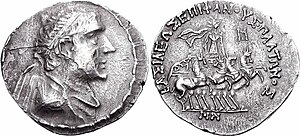Plato (Indo-Greek king)
Plato Epiphanes was an Indo-Greek king who lived in the 2nd century BC. Ruled. So far it is only known from very few coins.
The location of these coins may indicate that he ruled in the Hindu Kush as a vassal king of the Greco-Bactrian rulers. The coins are similar to those of Eukratides I , so that both rulers may have ruled at about the same time. According to an earlier theory, a coin was thought to have been dated after the Seleucid era , which means that it was dated to the year 166 BC. Would have meant. However, according to recent research, it belongs to the newly discovered Yavana era (where Yavana is translated as Ionian ) and was consequently founded in 138 or 137 BC. Minted. The very small number of coins found suggests a very short period of reign.
The epithet epiphanes quoted on the coin , meaning “appeared” or “appeared god” and the fact that Plato was the only Bactrian king to have Helios depicted on a coin , suggests that he did not legitimize his claim to power through descent. Hence, it is believed that Plato was one of the many usurpers on the Bactrian throne. This is also supported by the fact that only the tetradrachm used to pay soldiers is known, smaller denominations were not found. As a result, Plato may not have ruled over any of the larger cities where the copper alloy change was minted for long. No coin of the ruler was found in Ai Khanoum . Due to the distribution and type of coins found, it is assumed that Plato's dominion was limited to Bactrian areas north of the Hindu Kush.
literature
- Peter Franz Mittag : The source value of money for ancient studies. In: Ulrike Egelhaaf-Gaiser , Dennis Pausch , Meike Rühl (ed.): Culture of antiquity. Transdisciplinary work in classical studies. Verlag Antike, Berlin 2011, ISBN 978-3-938032-41-1 , pp. 159-161.
- William W. Tarn: The Greeks in Bactria and India. 2nd Edition. Cambridge University Press, Cambridge 1951, pp. 209-210.
| personal data | |
|---|---|
| SURNAME | Plato |
| ALTERNATIVE NAMES | Plato Epiphanes; plato |
| BRIEF DESCRIPTION | Indo-Greek king |
| DATE OF BIRTH | 2nd century BC Chr. |
| DATE OF DEATH | 2nd century BC Chr. |
